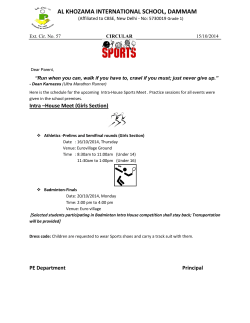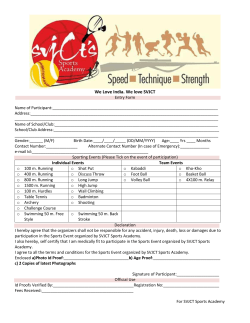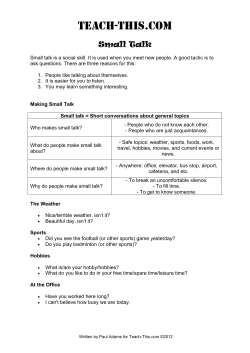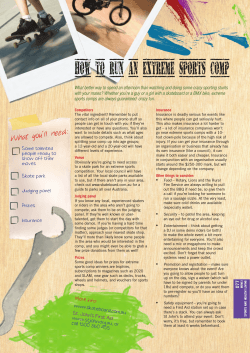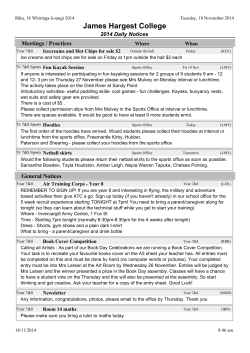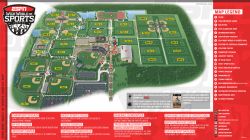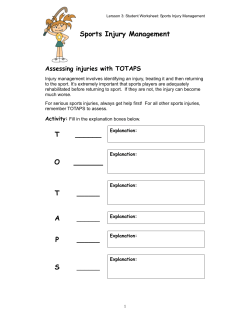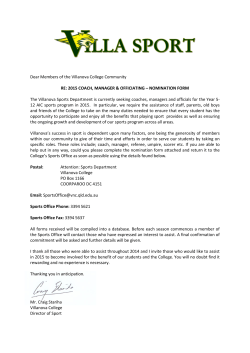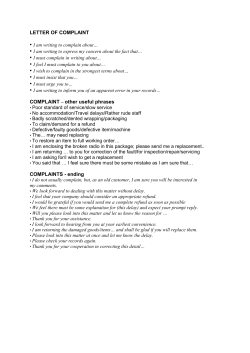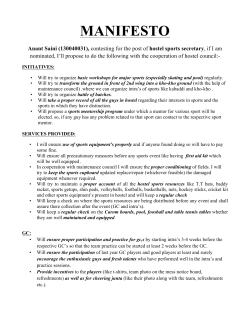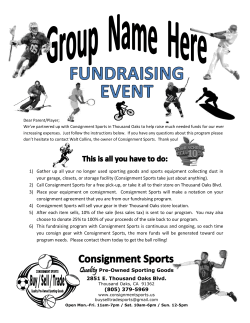
Document 71340
How often are the joyful sounds of laughing children running around a soccer field, gravitating to the ball like bees are drawn to honey, drowned out by parents screaming at their players to “get the ball, run faster, score a goal, NOW!” We have all witnessed accounts of competitive, agitated parents coaching from the bleachers at our children’s sporting contests; a problem that has recently received local and national attention. USA Today (Sept. 8, 1999) reported an extreme case in which the Northern Ohio Girls’ Soccer League declared Oct. 3, 1999 “Silent Sunday.” League President Al Soper felt that the loud-mouthed parents on the sidelines were so severely affecting coaches, referees and players that it was necessary to teach them a lesson by putting them on mute during Parents struggle to the game. “If parents don’t shut up,” Soper threatened, “they will be encourage children to asked to go to their cars.” seek out a positive and fun sporting There are a variety of reasons why parental participation has become experience while at increasingly problematic in recent years. Sports are one facet of our the same time wanting society in which differing messages about what it means to be them to “succeed” in successful mesh, and at times, clash. As a parent, it’s natural to judge your daughter’s successes by the look of determination in her eyes, the the competitive environment that brightness of her smile and the pride displayed on her face after marks athletic achieving a personal accomplishment. As a member of a society in participation which success is often defined by wins versus losses and aptitude is frequently measured by comparison, you may be inclined to judge your child’s successes by the numbers of goals scored, baskets made, party invitations received and A’s earned. Parents struggle to encourage children to seek out a positive and fun sporting experience while at the same time wanting them to “succeed” in the competitive environment that marks athletic participation. The line between being supportive and applying too much pressure is a blurry one, and parents often rely solely on their own judgement and experiences to behave in an appropriate and compassionate manner. How can parents know how to best guide their daughters in their athletic endeavors? In March 2000, the Women’s Sports Foundation made available the revised Parents’ Guide to Girls’ Sports (available at www.womenssportsfoundation.org/cgibin/iowa/issues/family/article.html?record=804); a booklet that is printed both in English and in Spanish. The guide is an excellent resource for parents of young girls, as it focuses on issues specific to girls’ sports. Topics discussed include: How sports participation makes your daughter’s life happier and healthier How to deal with the terrific 2s (and 10s and 16s) of your daughter’s sports development WOMEN’S SPORTS MEDICINE PROGRAM/SPORTS MEDICINE CENTER 8700 Watertown Plank Rd, Milwaukee, WI 53226 TEL: (414) 805-7104 Special concerns for active, young girls Tips to keep you, the parent, on your toes What you need to know about coaching girls Levels of your involvement: coach, volunteer or spectator? The Parents’ Guide also offers two very valuable reference lists. These timeless guidelines are the bibles of parenting female athletes: Parents’ Game Plan: 10-Point Strategy Young Athletes’ Bill of Rights Next time you hear parents screaming at their daughter to “hit harder,” “score more threepointers” or “quit being a wimp,” rather than order them to spectate from the parking lot, you may want to suggest that they read a copy of the Parents’ Guide to Girls’ Sports. With the help of this new and improved resource, you can learn how to be supportive and encouraging without pushing your daughter too hard. You will be better able to strike the difficult balance between assessing your daughter’s success based on her happiness and enjoyment and measuring her success solely by her accomplishments. Your influence will make a positive difference not only in your daughter’s athletic career, but more importantly in her personal development into an assertive, confident individual. While enthusiasm and cheering can be inspiring, and it is natural to get caught up in the emotion of the game, parents should take care to follow proper sideline etiquette. Steps: 1. Cheer, don’t coach. Avoid yelling specific instructions and issuing commands. This can be extremely confusing for a child and possibly contrary to the coach’s instruction. 2. Avoid running up and down the sidelines shouting. If you want to follow the action, make sure that you don’t distract the players or block the view of other spectators. 3. Keep some comments to yourself. Do not speak out to the referee or linesman. Unless they are complimentary, do not direct comments to the members of the opposition. Remember parents can be red carded too!! 4. Stand, or sit, at least 3 to 5 yards back from the sidelines (touchlines). This is a rule in many youth leagues. 5. Demonstrate good sportsmanship by applauding exceptional moves by the opposition. Tips: Practice silence. Sometimes it is more relaxing for both parents and players, and you will likely view the game differently as well. Ask your children if they like you to cheer. The answer may surprise you. Be positive, never negative. If a child loses the ball, for example, “Way to hustle.” Is much better than “You can get that ball.” WOMEN’S SPORTS MEDICINE PROGRAM/SPORTS MEDICINE CENTER 8700 Watertown Plank Rd, Milwaukee, WI 53226 TEL: (414) 805-7104
© Copyright 2025
